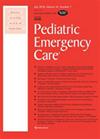小儿非公路车辆伤害:并排行驶对上肢的伤害更严重。
IF 1.2
4区 医学
Q3 EMERGENCY MEDICINE
引用次数: 0
摘要
目的并排车(SXS)和全地形车(ATV)是不同的越野车(ORV),但在文献中经常被归为一类。我们假设不同类型的越野车造成的小儿上肢(UE)骨折模式和损伤严重程度评分(ISS)有所不同。方法作者所在州的创伤资料库在2011-2021年期间发现了157例因越野车事故造成UE骨折的0至17岁小儿患者。我们使用《国际疾病分类》第 9 版和第 10 版编码确定了 ORV 伤情、骨折类型和手术方法,然后进行了人工病历审查或电话询问。我们确定了具体的 ORV 类型、驾驶员/乘客状态和约束装置的使用情况,以比较骨折特征、手术次数和 ISS 之间的差异。结果在 157 例 ORV 损伤中,全地形车造成 75 例(占 48%),SXS 造成 50 例(占 32%),其他车辆造成 32 例(占 20%)。平均年龄为 12 岁,49%(n = 77)的伤者需要接受手术治疗。与全地形车(7%,n = 5)和所有其他 ORV 类型(16%,n = 5;P < 0.0001)相比,SXS 受伤的开放性骨折率明显更高(42%,n = 21)。SXS发生事故后,70%的骨折者(35人)需要接受手术治疗,而全地形车的这一比例为41%(31人),所有其他ORV类型的这一比例为34%(11人)(P < 0.001)。SXS驾驶员71%为左侧受伤,而85%的乘客为右侧受伤(P < 0.0001)。13 岁以下患者(n = 73)的手术率(59%)明显高于 13 岁及以上患者(n = 84;P = 0.02)的 40%。全地形车(8±6)、SXS(8±6)和其他车辆(7±4;P = 0.34)的平均±SD ISS无明显差异。小轮摩托车驾驶员更有可能左侧受伤,而乘客右侧受伤的几率明显更高。与青少年相比,13 岁以下的患者更有可能需要手术治疗。本文章由计算机程序翻译,如有差异,请以英文原文为准。
Pediatric Off-Road Vehicle Injuries: Side-by-Sides Worse for the Upper Extremity.
OBJECTIVES
Side-by-side (SXS) and all-terrain vehicles (ATVs) are different off-road vehicles (ORVs) but often categorized together in the literature. We hypothesized pediatric upper extremity (UE) fracture patterns and injury severity scores (ISS) differ between ORV types.
METHODS
The authors' home-state trauma repository identified 157 pediatric patients aged 0 to 17 years with UE fractures after ORV accidents during 2011-2021. ORV injuries, fracture type, and procedures were identified using International Classification of Diseases, 9th Revision and 10th Revision coding followed by manual chart review or phone calls. We identified specific ORV type, driver/passenger status, and restraint use to compare differences between fracture characteristics, number of surgeries, and ISS. Groups were compared for differences at P < 0.05 significance.
RESULTS
Among 157 ORV injuries, 75 resulted from ATVs (48%), 50 SXSs (32%), and 32 from all other vehicles (20%). Average age was 12 years, and 49% (n = 77) required surgery. SXS injuries had significantly higher open fracture rates (42%, n = 21) compared with ATVs (7%, n = 5) and all other ORV types (16%, n = 5; P < 0.0001). Seventy percent of fractures (n = 35) sustained after SXS accidents required surgery compared with 41% (n = 31) for ATVs and 34% (n = 11) for all other ORV types (P < 0.001). SXS drivers had 71% left-sided injuries, whereas 85% passengers had right-sided injuries (P < 0.0001). Patients younger than 13 years (n = 73) had significantly higher surgery rates (59%) compared with 40% for those 13 years and older (n = 84; P = 0.02). There were no significant differences in mean ± SD ISS between ATV (8 ± 6), SXS (8 ± 6), and other vehicles (7 ± 4; P = 0.34).
CONCLUSIONS
UE fractures caused by SXS were more likely to be open and require surgery compared with ATVs and other ORVs. SXS drivers were more likely to sustain left-sided injuries, whereas passengers had significantly higher right-sided injuries. Patients younger than 13 years were more likely to require surgery compared with teenagers.
求助全文
通过发布文献求助,成功后即可免费获取论文全文。
去求助
来源期刊

Pediatric emergency care
医学-急救医学
CiteScore
2.40
自引率
14.30%
发文量
577
审稿时长
3-6 weeks
期刊介绍:
Pediatric Emergency Care®, features clinically relevant original articles with an EM perspective on the care of acutely ill or injured children and adolescents. The journal is aimed at both the pediatrician who wants to know more about treating and being compensated for minor emergency cases and the emergency physicians who must treat children or adolescents in more than one case in there.
 求助内容:
求助内容: 应助结果提醒方式:
应助结果提醒方式:


